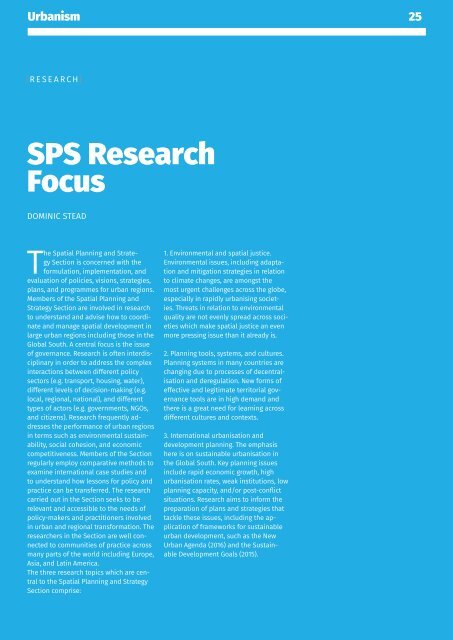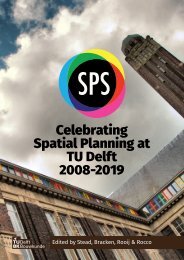*Celebrating Spatial Planning at TU Delft: 2008-2019. Edited by Stead, Bracken, Rooij & Rocco
This is a summary of the achievements of the session Spatial Planning & Strategy of the Department of Urbanism, Faculty of Architecture and the Built Environment, TU Delft, led by Professor Vincent Nadin between 2008 and 2019.
This is a summary of the achievements of the session Spatial Planning & Strategy of the Department of Urbanism, Faculty of Architecture and the Built Environment, TU Delft, led by Professor Vincent Nadin between 2008 and 2019.
You also want an ePaper? Increase the reach of your titles
YUMPU automatically turns print PDFs into web optimized ePapers that Google loves.
Urbanism . <strong>TU</strong> <strong>Delft</strong> 25<br />
[RESEARCH]<br />
SPS Research<br />
Focus<br />
DOMINIC STEAD<br />
The <strong>Sp<strong>at</strong>ial</strong> <strong>Planning</strong> and Str<strong>at</strong>egy<br />
Section is concerned with the<br />
formul<strong>at</strong>ion, implement<strong>at</strong>ion, and<br />
evalu<strong>at</strong>ion of policies, visions, str<strong>at</strong>egies,<br />
plans, and programmes for urban regions.<br />
Members of the <strong>Sp<strong>at</strong>ial</strong> <strong>Planning</strong> and<br />
Str<strong>at</strong>egy Section are involved in research<br />
to understand and advise how to coordin<strong>at</strong>e<br />
and manage sp<strong>at</strong>ial development in<br />
large urban regions including those in the<br />
Global South. A central focus is the issue<br />
of governance. Research is often interdisciplinary<br />
in order to address the complex<br />
interactions between different policy<br />
sectors (e.g. transport, housing, w<strong>at</strong>er),<br />
different levels of decision-making (e.g.<br />
local, regional, n<strong>at</strong>ional), and different<br />
types of actors (e.g. governments, NGOs,<br />
and citizens). Research frequently addresses<br />
the performance of urban regions<br />
in terms such as environmental sustainability,<br />
social cohesion, and economic<br />
competitiveness. Members of the Section<br />
regularly employ compar<strong>at</strong>ive methods to<br />
examine intern<strong>at</strong>ional case studies and<br />
to understand how lessons for policy and<br />
practice can be transferred. The research<br />
carried out in the Section seeks to be<br />
relevant and accessible to the needs of<br />
policy-makers and practitioners involved<br />
in urban and regional transform<strong>at</strong>ion. The<br />
researchers in the Section are well connected<br />
to communities of practice across<br />
many parts of the world including Europe,<br />
Asia, and L<strong>at</strong>in America.<br />
The three research topics which are central<br />
to the <strong>Sp<strong>at</strong>ial</strong> <strong>Planning</strong> and Str<strong>at</strong>egy<br />
Section comprise:<br />
1. Environmental and sp<strong>at</strong>ial justice.<br />
Environmental issues, including adapt<strong>at</strong>ion<br />
and mitig<strong>at</strong>ion str<strong>at</strong>egies in rel<strong>at</strong>ion<br />
to clim<strong>at</strong>e changes, are amongst the<br />
most urgent challenges across the globe,<br />
especially in rapidly urbanising societies.<br />
Thre<strong>at</strong>s in rel<strong>at</strong>ion to environmental<br />
quality are not evenly spread across societies<br />
which make sp<strong>at</strong>ial justice an even<br />
more pressing issue than it already is.<br />
2. <strong>Planning</strong> tools, systems, and cultures.<br />
<strong>Planning</strong> systems in many countries are<br />
changing due to processes of decentralis<strong>at</strong>ion<br />
and deregul<strong>at</strong>ion. New forms of<br />
effective and legitim<strong>at</strong>e territorial governance<br />
tools are in high demand and<br />
there is a gre<strong>at</strong> need for learning across<br />
different cultures and contexts.<br />
3. Intern<strong>at</strong>ional urbanis<strong>at</strong>ion and<br />
development planning. The emphasis<br />
here is on sustainable urbanis<strong>at</strong>ion in<br />
the Global South. Key planning issues<br />
include rapid economic growth, high<br />
urbanis<strong>at</strong>ion r<strong>at</strong>es, weak institutions, low<br />
planning capacity, and/or post-conflict<br />
situ<strong>at</strong>ions. Research aims to inform the<br />
prepar<strong>at</strong>ion of plans and str<strong>at</strong>egies th<strong>at</strong><br />
tackle these issues, including the applic<strong>at</strong>ion<br />
of frameworks for sustainable<br />
urban development, such as the New<br />
Urban Agenda (2016) and the Sustainable<br />
Development Goals (2015).




